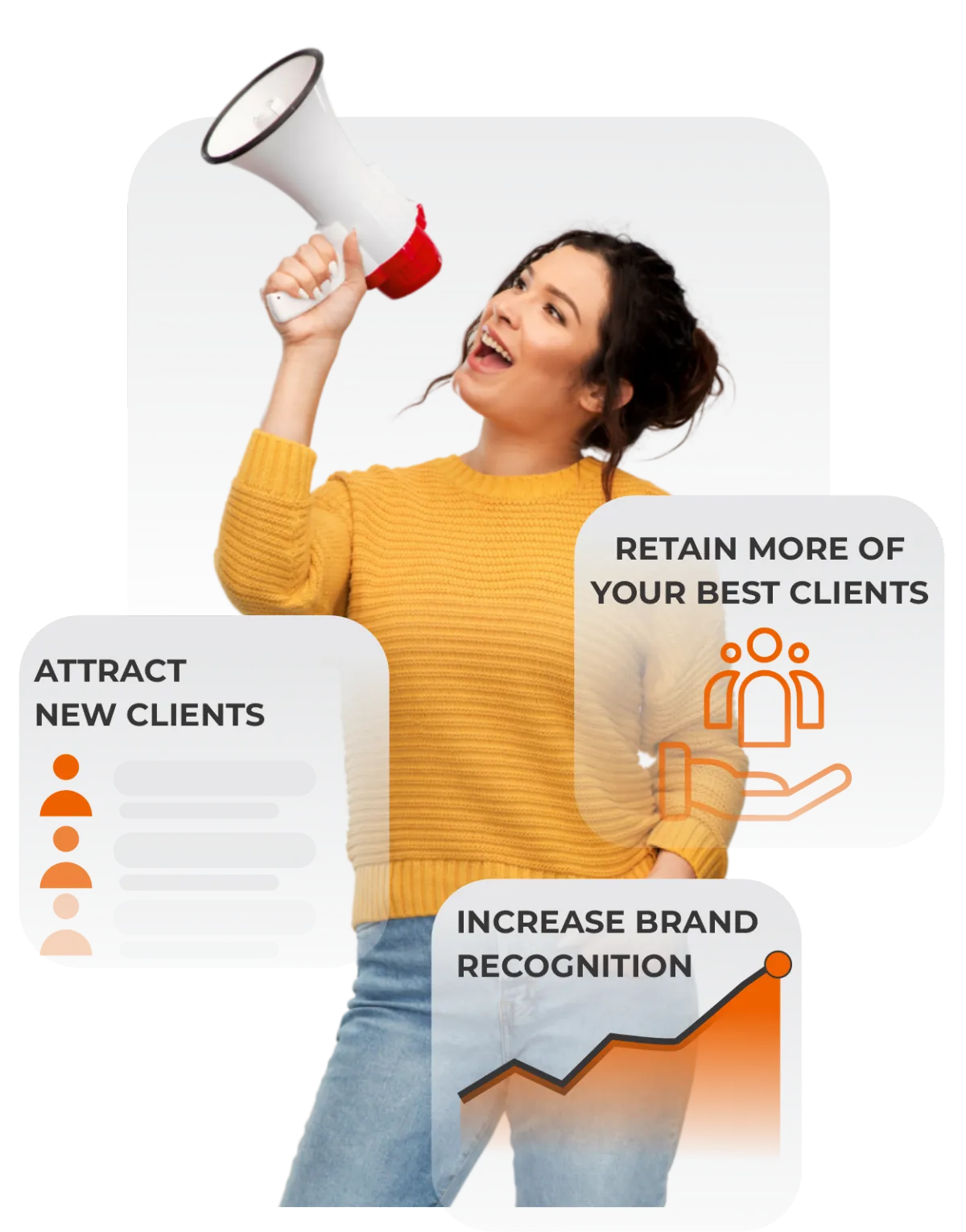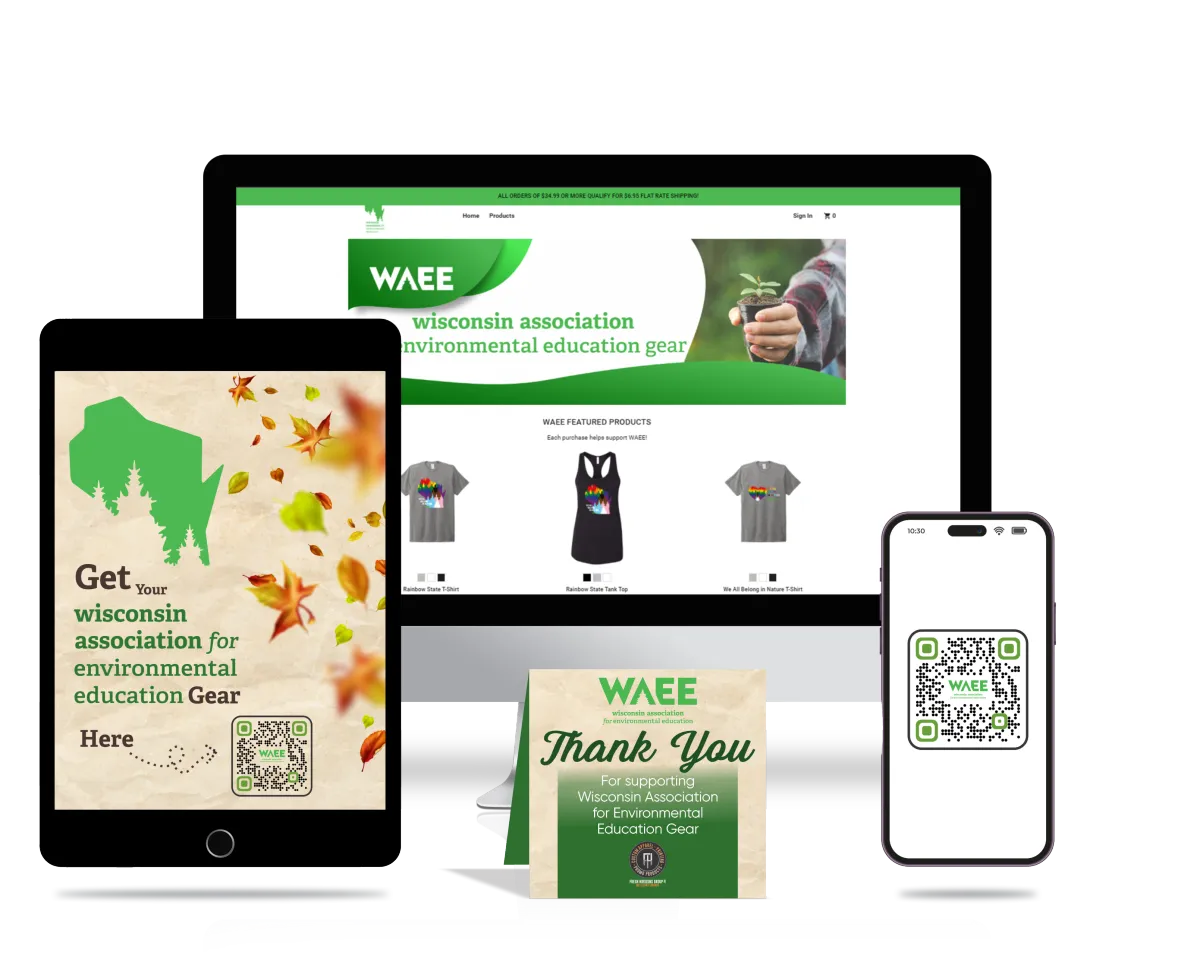Elevate Your Brand
Elevating Brands and Expanding Horizons

Elevating Brands and Expanding Horizons

Tired of feeling frustrated with your marketing efforts? Fresh Horizons has the solution with our 3 core tools: Digital Marketing, Custom Apparel, and Promotional Products. Say goodbye to frustration and hello to success with Fresh Horizons.

Get results that matter with our powerful marketing tools. From CRM and websites to sales funnels, missed call text back, and email campaigns - we've got you covered. Elevate your business today!

Elevate your brand and team spirit with custom apparel. Impress clients, instill pride in employees, and stand out from the competition. Let us help you make a lasting impression.

Promote with ease and confidence! Our access to over 1 million promotional products ensures you'll find the perfect fit for your brand, no matter the occasion. Let us help you create lasting recognition today.

Revolutionize Your Marketing with Our Powerful Technology.
Is it time to take your marketing game to new heights? Fresh Horizons Group has got you covered with a suite of powerful tools that will make your competitors green with envy. From stunning websites and killer sales funnels to email campaigns that pack a punch, we've got all the tricks up our sleeve to generate leads, boost conversions, and keep your customers coming back for more. Say hello to success!
Ready to skyrocket your business like never before? With Fresh Horizons Group, you're not just getting snazzy websites and killer sales funnels - you're investing in a future of unstoppable growth. We'll help you magnetize new customers, make your competitors eat your digital dust, and turn your one-time buyers into die-hard fans. So strap in, and let's ride the wave to success together!
Discover a treasure trove of business and marketing insights on Fresh Horizons Group's blog.
From captivating articles to expert advice, unlock the secrets to success and stay ahead of the competition. Join the conversation today!

How to Choose the Right Digital Marketing Agency for Your Business: Expert Guide to Selecting the Best Marketing Partner
Selecting the right digital marketing agency is the decisive factor that determines your business’s online growth, lead generation, and return on ad spend. Many organizations struggle with misaligned expectations, hidden fees, and unclear performance metrics when partnering with a marketing agency. This guide resolves that pain by walking you through each step—from defining objectives and identifying agency types to evaluating expertise, pricing models, and long-term performance measurement. You will learn how to clarify goals, compare full-service versus niche providers, assess data-driven credentials, and ask the critical questions that guarantee transparency and sustainable ROI. The sections below map the full selection process:
What Are Your Business Goals and Digital Marketing Needs?
What Types of Digital Marketing Agencies Should You Consider?
What Are the Key Criteria for Evaluating a Digital Marketing Agency?
What Essential Questions Should You Ask Prospective Digital Marketing Agencies?
How Do Digital Marketing Agency Pricing Models and Contracts Work?
How Can You Measure Agency Performance and Ensure Long-Term Success?
What Are Common Red Flags and How Can You Avoid Choosing the Wrong Agency?
How to Make an Informed Decision and Choose the Best Digital Marketing Agency for Your Business?
By following this expert framework, your business will confidently select a marketing partner aligned with its strategic vision and growth trajectory.
Clarifying your business goals and digital marketing needs anchors the agency selection process by ensuring alignment on outcomes like lead volume, brand visibility, or e-commerce conversions. Defining objectives also reveals resource gaps and service requirements that an agency must fill to deliver measurable ROI.
Core objectives translate business ambitions into marketing metrics. Lead generation targets increase qualified inquiries by optimizing conversion funnels, while brand awareness campaigns focus on reach and engagement across channels. For example, setting a goal to grow monthly leads by 30% creates a clear benchmark for campaign structure and budget allocation. Identifying precise metrics like cost per lead (CPL) and social impressions sets the foundation for measurement and strategic alignment with your chosen agency.
Evaluating internal marketing maturity reveals whether you have in-house expertise, technology platforms, or content resources to support agency collaboration. A maturity assessment considers current team skills, marketing tools (e.g., CRM, analytics software), and content production capacity. Recognizing gaps in areas such as SEO technical audits or paid media management ensures you select an agency whose offerings complement your existing capabilities and drive cohesive execution.
Identifying required services ensures that your agency partner provides the right mix of expertise. Common offerings include:
SEO for organic visibility and technical site optimization
PPC (Pay-Per-Click) for targeted lead acquisition and budget control
Content Marketing for thought leadership, lead nurturing, and site authority
Social Media Marketing for community engagement and brand storytelling
Each service addresses a different stage of the customer journey. Choosing the right combination delivers balanced growth across acquisition, retention, and brand equity.
By defining goals, assessing maturity, and specifying services, you establish the criteria that guide the selection of agency types and specializations.
Digital marketing agencies differ in scope, specialization, and service depth. Understanding these models helps you match agency capabilities with your business requirements.
Full-service agencies offer end-to-end marketing solutions, combining SEO, PPC, content, social media, design, and analytics under one roof. Niche agencies focus on a particular industry or vertical—such as healthcare or B2B technology—bringing deep domain expertise. Specialist agencies concentrate on one core discipline (e.g., an SEO agency or a paid-media shop). Choosing among these depends on whether you need broad coverage, vertical insights, or top-tier skill in a single channel.
Align agency specialization to your objectives. If rapid lead generation through paid channels is your priority, a PPC specialist may deliver faster ROI. If you aim to build thought leadership, a content marketing agency with industry credentials can amplify brand authority. Matching specialization with goals ensures resources are invested where they generate the most business impact, rather than paying for unused services.
Agencies typically package core services around strategic pillars:
EntityAttributeValueSEO AgencyFocusKeyword research, on-page optimization, technical audits, link buildingPPC AgencySpecializationCampaign setup, bid management, A/B testing, ROI trackingWeb Design AgencyExpertiseResponsive design, UX/UI, conversion-focused layoutsCRO AgencyCapabilityFunnel analysis, multivariate testing, user behavior optimization
Selecting the right service mix avoids scope overlap and ensures each specialist contributes measurable improvements. Understanding these service offerings leads seamlessly into evaluating agencies against quality and performance criteria.

Evaluating agencies on proven expertise, communication, methodology, and cultural fit helps you avoid misalignment and maximize outcome predictability.
Selecting a digital marketing agency requires careful evaluation of expertise, communication, and methodology. Agencies should demonstrate a proven track record through case studies and client testimonials, showcasing their ability to deliver measurable results. Transparent communication and data-driven approaches are also essential for successful partnerships.
Smith, J., & Jones, A. "Digital Marketing Agency Selection: A Comprehensive Guide" (2022)
This research provides a framework for evaluating digital marketing agencies, aligning with the article's emphasis on expertise, communication, and data-driven methodologies.
Proven expertise surfaces through documented case studies, industry certifications (e.g., Google Ads, Google Analytics), and client lists in your sector. Request examples of campaigns that achieved metrics similar to your goals—such as a 50% increase in organic traffic or a 200% ROAS on paid media. Verifying these examples confirms the agency’s ability to replicate success for your business.
Case studies demonstrate problem-solving approaches, methodologies, and quantifiable outcomes. Portfolios provide visual proof of design and content quality, while client testimonials reveal ongoing satisfaction and support levels. Together, they form a narrative of reliability and credibility that exceeds generic claims and underpins trust in the agency’s capabilities.
Transparent communication ensures you receive regular updates, access to performance dashboards, and clear explanations of strategy adjustments. Collaborative approaches—such as weekly check-ins and shared project management tools—foster alignment and rapid decision-making. Agencies that prioritize openness reduce project friction and accelerate optimization cycles.
Data-driven agencies define success through key performance indicators (KPIs) and analytics platforms from day one. They establish baseline metrics, set targets, and deliver custom dashboards in tools like Google Analytics or Data Studio. This methodology enables continuous performance monitoring, hypothesis testing, and ROI attribution.
Agencies that incorporate emerging technologies—such as AI for bid optimization, automated content generation, or predictive analytics—stay ahead of market trends. Their willingness to pilot new tools signals a future-proof partnership that evolves with digital platforms and consumer behaviors.
Cultural fit shapes how smoothly your teams collaborate. Shared values, compatible workflows, and mutual respect enable strategic alignment beyond contractual obligations. An agency whose culture matches yours drives better communication, faster problem-solving, and a partnership mentality focused on collective success.
When these criteria are applied holistically, you create a comprehensive scorecard that identifies the agency most capable of driving your objectives.
Asking targeted questions reveals an agency’s strategic processes, team structure, performance frameworks, and commercial terms.
Inquire how they onboard new clients, including discovery sessions, competitor analysis, and strategic roadmaps. A structured methodology—complete with timeline milestones and deliverables—demonstrates organizational rigor and reduces onboarding friction.
Ask about team composition, in-house versus outsourced resources, and certifications held by specialists (e.g., Facebook Blueprint, HubSpot Academy). Understanding who executes your work clarifies accountability and quality assurance.
Request details on KPI definitions, reporting cadence, and data access. Questions might include: “Which metrics define success for my campaign?” and “How frequently will I receive detailed performance reports and analytics access?”
Clarify whether pricing is hourly, retainer-based, project-based, performance-driven, or value-based. Request explicit breakdowns of fees, scope of work, deliverables, revision policies, and termination clauses to avoid surprises and ensure budget alignment.
By asking these questions, you gain insight into agency operations, accountability measures, and contractual clarity—key factors in forging a successful partnership.
Understanding common pricing structures and contract elements ensures cost transparency and sets realistic budget expectations.
Digital marketing agencies use various pricing models, including hourly, project-based, retainer, performance-based, and value-based. The choice of model depends on the project's scope, the client's budget, and the desired level of risk-sharing. Understanding these models is crucial for budget planning and aligning agency incentives with business goals.
Brown, L. "Pricing Strategies for Digital Marketing Agencies" (2023)
This research supports the article's discussion of different pricing models, providing a deeper understanding of their characteristics and implications.
Agencies typically adopt one or more models:
EntityModel TypeCharacteristicsHourlyTime-BasedCharged by the hour; suited for ad-hoc tasks or short-term projectsProject-BasedFixed-FeeDefined deliverables for a set fee; best for website builds or one-off campaignsRetainerRecurring FeeMonthly commitment for ongoing services; ensures dedicated resources and priority schedulingPerformance-BasedIncentive FeeFees tied to performance milestones (e.g., CPL targets); aligns agency incentives with outcomesValue-BasedOutcome-DrivenFees linked to business results (e.g., percentage of revenue uplift); promotes shared risk
A comprehensive contract outlines:
Scope of work with specific services and deliverables
Payment terms and invoicing schedules
Intellectual property rights and data ownership
Term length, renewal options, and termination clauses
Service level agreements (SLAs) for response times and deliverables
Budget effectively by mapping marketing investment to projected ROI. Allocate funds based on channel efficiency—such as assigning a larger budget to PPC if it delivers higher ROAS—and reserve contingency for testing new tactics. Incorporate projected revenue gains into budget models to validate spend.
Armed with pricing insights and contract best practices, you can negotiate terms that align investment with expected outcomes.
Performance measurement and collaboration are vital for sustaining returns and refining strategies.
Tracking relevant Key Performance Indicators (KPIs) is essential for measuring the success of digital marketing campaigns. Conversion rates, lead generation, Return on Ad Spend (ROAS), and organic traffic are critical metrics to monitor. Agencies should provide transparent reporting and data access to ensure accountability and facilitate continuous improvement.
Davis, M., "KPIs for Digital Marketing Success" (2024)
This research reinforces the importance of tracking specific KPIs, aligning with the article's emphasis on data-driven decision-making and performance measurement.
Conversion Rate for website or landing page effectiveness
Number of Qualified Leads for top-of-funnel performance
Return on Ad Spend (ROAS) for paid media efficiency
Organic Traffic Volume and keyword rankings for SEO health
Require agency dashboards in platforms like Google Analytics, Google Data Studio, or proprietary tools. Insist on full data access, raw export capabilities, and real-time reporting links to ensure transparency and foster trust in performance claims.
Establish regular performance reviews, joint workshops for strategy refinement, and a shared feedback loop. Quarterly business reviews that align marketing metrics with overall business KPIs facilitate continuous optimization and strengthen the partnership.
Implementing these measurement and collaboration practices cements a high-impact, long-term relationship with your agency.
Identifying warning signs early helps you steer clear of partnerships that undermine objectives.
Beware agencies that avoid scheduled calls, delay deliverables without explanation, or provide vague status updates. Inadequate communication often signals deeper issues in process management and client prioritization.
Steer clear of agencies promising “overnight” rankings or guaranteed #1 positions without evidence. If case studies lack quantifiable metrics or appear too generic, request more detailed performance data or references to confirm authenticity.
Contracts that omit clear deliverables, contain broad termination penalties, or hide fee escalators deserve scrutiny. Ambiguous terms can lock you into unfavorable agreements with limited exit options.
Recognizing these red flags early prevents wasted budgets and misaligned partnerships, ensuring you move forward with confidence.

A structured decision framework integrates all evaluation criteria, ensuring you select the agency best suited to achieve your goals.
Confirm alignment between your goals and the agency’s specialization.
Score each agency against evaluation criteria: expertise, case studies, communication, data capabilities, innovation, and cultural fit.
Compare proposals, pricing models, and contract terms side by side.
Conduct final interviews to clarify any remaining questions and assess team chemistry.
Select the agency with the highest overall score and clear roadmap for achieving your objectives.
This step-by-step flow ensures a disciplined and transparent selection process.
Choosing an agency is not just a transaction but the start of a strategic partnership. Prioritize agencies that demonstrate a commitment to long-term growth through collaborative planning, proactive innovation, and shared accountability on ROI targets. This alignment transforms the agency relationship into a catalyst for sustained business expansion and profitability.
Following this expert guide, your business can confidently identify and partner with the digital marketing agency that best matches your strategic vision, resource capabilities, and growth ambitions.
Get a FREE MARKETING audit for your business.
Get a FREE MARKETING audit for your business.
